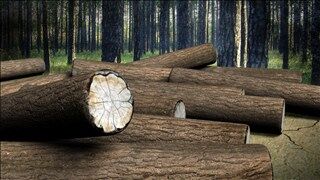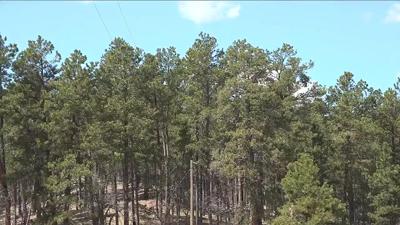Cheyenne, Wyo. - Rep. John Eklund thought back a half century, to an era when commercial sawmills processing Wyoming timber abounded and logging was the Equality State's third-largest industry.
"We should be able to get back to that," the Cheyenne Republican said Tuesday morning in the Wyoming Capitol.
As WyoFile reports, it'd be a monumental recovery.
Commercial logging in national forests around the country, including Wyoming, has fallen off dramatically from its heyday. Cut and sold timber has stagnated at a fraction of what it was from the 1950s through the 1980s for three decades running, U.S. Department of Agriculture data shows.
klund made the remarks during the Legislature's annual "forest health briefing," a gathering that convenes state and federal foresters with state lawmakers to discuss the status of Wyoming's forests. There was talk of current events, like Wyoming's largest wildfire year since 1988, but much of the discourse Tuesday revolved around the reeling state of the timber industry — and what the second Trump administration might be able to do about it.
Sen. Bob Ide, a Casper Republican, who has qualms with the very concept of federal land, asked the foresters in the room what they thought of Trump's executive order dropped over the weekend intended to stimulate logging.
The order, titled "Immediate Expansion of American Timber Production," streamlines permitting processes and outlines steps that can "move projects on the ground faster," Wyoming State Forester Kelly Norris told Ide.
Among other steps, the order compels new Interior Secretary Doug Burgum and Agriculture Secretary Brooke Rollins to identify timber-cutting goals within 90 days for Bureau of Land Management and U.S. Forest Service property. Within 180 days, Burgum and Rollins are also on the hook to develop new "categorical exclusions" to the National Environmental Policy Act that could enable logging projects without time-consuming reviews of the impacts.
Trump's order isn't the only prospective policy change afoot that could revitalize commercially cutting American forests. The "Fix Our Forests Act," a measure from Rep. Bruce Westerman, R-Arkansas and co-sponsored by Wyoming Rep. Harriet Hageman, has passed the U.S. House of Representatives and moved to the U.S. Senate. The bill, proving divisive in big commercial timber country, would further expedite environmental reviews — and could potentially have immediate impacts in Wyoming.
"I'm optimistic that the Fix Our Forests Act is going to pass," U.S. Forest Service Rocky Mountain Regional Forester Troy Heithecker told lawmakers in attendance. "And we're ready. We have projects lined up as soon as that bill passes."
Later, Heithecker pointed toward the Shoshone National Forest's Dunoir area, which he called a "high-risk fireshed," as an example.
"If Fix Our Forests [Act] goes through, all those high-risk firesheds have a whole bunch of exemptions where we can streamline work," he said. "And we have funding through the Wildfire Crisis Strategy … to help fuel reductions in that fireshed."
Still, reviving Wyoming's logging industry in a place like the Wind River basin faces big headwinds. Dubois' timber mill has been closed for decades, and, out of necessity, the community has moved on economically.
"It is more challenging in that part of the state, because the infrastructure is already lost," Norris, the state forester, told lawmakers.
Today, only two mills hang on in Wyoming: One in Saratoga, the other in Hulett. The farther geographically a timber-cutting project is from those mills, the tougher it is to pencil out.

















